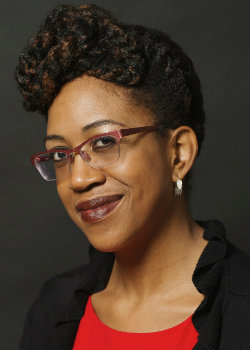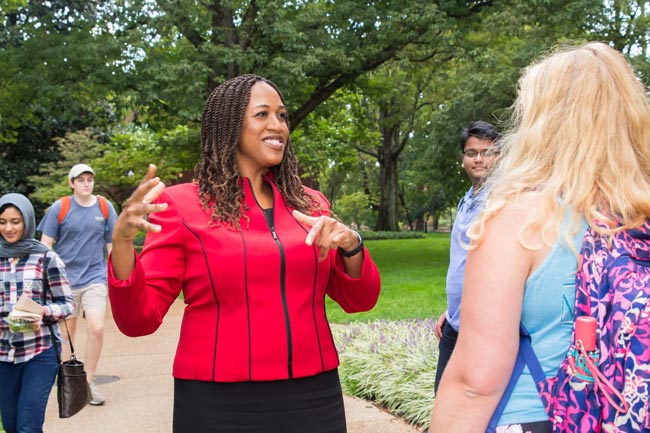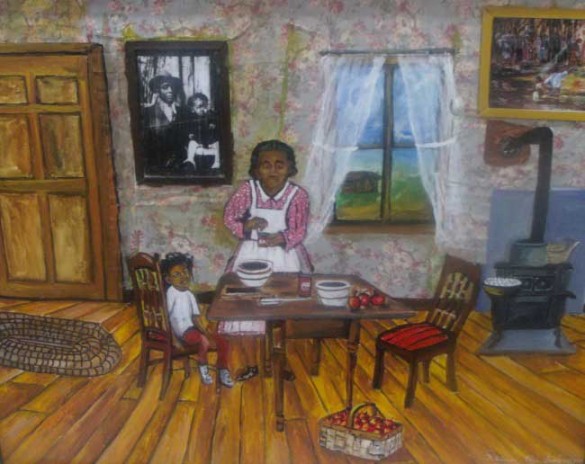
Ifeoma Nwankwo has leveraged the interpersonal skills she honed during her research-based initiatives to build community between older and younger generations with her recent work to advance inclusive innovation across all of Vanderbilt University.
Nwankwo is completing three years as associate provost for strategic initiatives and partnerships as one of the first Chancellor’s Higher Education Fellows. She has strived to foster cross-disciplinary collaborations on projects ranging from Trans-Institutional Programs to the art selected for residential college buildings.
“I want to thank Ifeoma for being a part of our efforts these past few years,” said Provost and Vice Chancellor for Academic Affairs Susan R. Wente. “I am excited about what’s next for her and wish her the best.”
“My role in the Office of the Provost can best be described as ‘bridge building,’ reaching out to faculty across disciplines to encourage their engagement with multiple initiatives that are central to the Academic Strategic Plan,” said Nwankwo, associate professor of English and American studies. “The many friendships and positive relationships I developed across campus while working on the TIPs-funded Wisdom Working Group, the course on civil rights in the United States and Northern Ireland, and other projects have proved to be very valuable in my administrative role.”
After the Wond’ry launched in 2016, Nwankwo worked to make sure faculty in the humanities, education and social sciences saw the nationally recognized center for innovation and design as relevant to advancing their teaching and research. She also led the Library Collections Initiative, which funded disciplinarily diverse faculty projects to strategically bolster collections in support of research and scholarship. Her portfolio also included the Arts & Humanities Rapid Response Grant Program and the Multicultural University Courses Selection Committee.
In addition, she chaired the Faculty Standing Committee for Campus Planning Consultation on Building Art. “Our goal has been making sure that the art represented on campus buildings reflects the beloved, inclusive community that we are striving to be,” she said.

As Nwankwo prepares for a year-long sabbatical, she is excited to resume her analytical study of more than 250 interviews conducted for two projects she founded: Voices from Our America, which collects, preserves and circulates forgotten and hidden narratives of the American experience while linking academic research, K-12 curriculum development and community engagement, and The Wisdom Project, which recognizes older adults’ life- and soul-sustaining wisdoms and productively incorporates them into K-12, undergraduate, graduate and health professions education. The latter is a three-pronged initiative that includes The Wisdom of the Elders, the Wisdom Working Group and the Wisdom Digitized Wisdom Multiplied app.
“Interviews we’ve collected include African American elders who grew up in the Jim Crow South; Panamanians of West Indian descent whose black British ancestors performed death-defying labor to build the Panama Canal; and African American women expatriates, tourists and travelers,” Nwankwo said. “My research is examining their approaches to operationalizing intergenerational and intercultural relationships in the service of sociopolitical change. I have a strong interest in how the knowledge of elders, especially women elders, can be put into action within and across local, national and international communities.”
Nwankwo plans to produce a book based on the 250 plus interviews. “I find the work of the late Pulitzer Prize-winning author Lewis “Studs” Terkel very inspiring, as I do that of iconic pathbreaker-pioneer-preserver Dorothy Sterling,” she said.
The Wisdom of the Elders initiative, from which many of the interviews were collected, began in 2012 at the Patterson Park Community Center in Murfreesboro, Tennessee. Three years later, the city of Murfreesboro began funding the continuation of the project, which was renamed African American Voices of Past and Present by the elders and instructors. They also subsequently created a vibrant community organization, the African American Heritage Society of Rutherford County.
Nwankwo credits her Jamaican grandparents with nurturing her keen interest in uncovering the neglected histories of past generations, especially those of African and Caribbean descent, and preserving their stories for today’s learners.
“These seniors have so many life lessons to share as learners, innovators and teachers,” Nwankwo said. “The very act of living a long life and having to deal with as many challenges as they do make them wise individuals who could write many monographs.”

Support from The Andrew W. Mellon Foundation, which awarded a three-year grant to The Wisdom of the Elders in 2015, has enabled the initiative to grow and thrive in other cities, such as New Orleans, with plans moving forward in the Middle Tennessee counties of Wilson and Maury. In addition, a how-to manual has been compiled and workshops are planned for other cities interested in the project.
Nwankwo will also focus on a new curriculum that she and Dr. James S. Powers, a professor of geriatrics, have created and tested that is geared toward medical professionals working with older adults from marginalized communities. “Our curriculum espouses narrative medicine—encouraging a holistic view of the patient, rather than as their diagnosis—as heart murmur in Room xxx, dementia at x facility, or depression at 55 XX street,” she said.
Nwankwo and her team have collaborated with the Vanderbilt Program for Interprofessional Learning, a longitudinal clinic experience in which professional students from graduate programs in medicine, advanced practice nursing, pharmacy and social work are placed in working-learning teams of four—one from each discipline—in order to develop an understanding of and respect for their health care colleagues with different training and skill sets.
Nwankwo is also working toward completion of two other book projects. One centers on the scribal cultures born of identity-, memory- and change- making methodologies employed by Afro-diasporic communities in Latin America. The other focuses on the impact of race and racism on the theory, practice and prioritization of the digital and public humanities.
Nwankwo earned her doctorate in 1999 from Duke University, with certificates in Latin American studies and African American and diaspora studies. She joined the Vanderbilt faculty in 2006 and served as director of the Program in American Studies during the 2015-16 academic year. She recently completed the Harvard Institutes for Higher Education’s Management Development Program.
“In addition to the research and writing that I will undertake during my sabbatical, I will take time to reflect on all of my enlightening learning opportunities from the past three years in university administration, for which I am very grateful. I will consider how best to chart my path forward in higher education as a scholar and leader,” Nwankwo said.